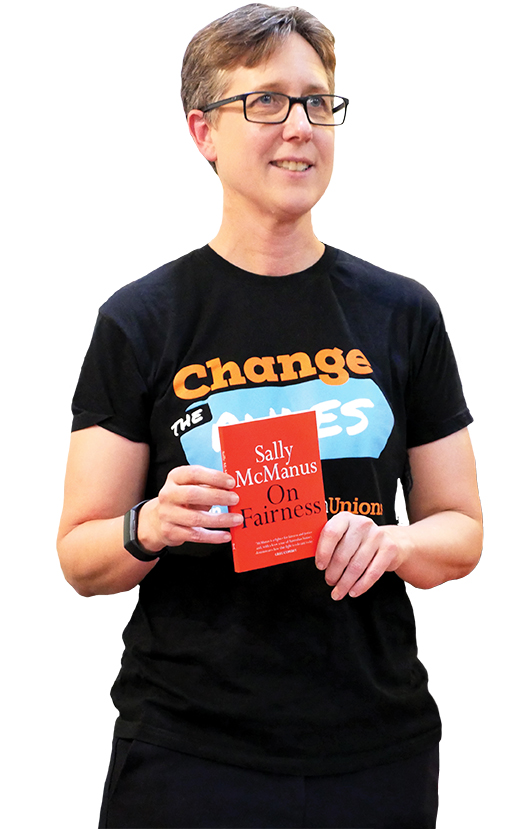Sally McManus On Fairness

ACTU Secretary, Sally McManus, has written a book ‘On Fairness’ which outlines the critical role of the Australian union movement in achieving a fair and more equal society.
It’s a reminder that Australian unions created the fair go by insisting on rules for fairness. The book also explores the true cost of social injustice and inequality in the workforce.
The book begins by telling the inside story of Sally’s controversial first TV interview as ACTU Secretary with ABC’s Leigh Sales. During the interview Leigh Sales asked whether the ACTU would distance itself from the CFMEU, “which has faced 118 separate legal proceedings where it’s found to have either broken the law or acted in contempt of court?"
Sally replied that there was no way we would be doing so given that “the CFMEU, when they’ve been fined, have been fined for taking industrial action.”
“Illegal industrial action?” asked Leigh Sales.
“It might be illegal industrial action according to our current laws…but
our current laws are wrong,” shot back Sally.
“Regardless of whether you agree or disagree with those laws, you said that you believe in the rule of law?” asked Sales.
“Yeah I believe in the rule of law where the law is fair, when the law is right. But when it’s unjust, I don’t think there’s a problem with breaking it,” replied Sally.
In the wake of the interview right wing politicians and commentators lost their minds and Sally found herself in the middle of a media storm of outrage.
The book goes on to put this controversy into the historical context of the labour movement’s past wins. From Medicare to apartheid; the 38 hour week to the 1970s green bans – our movement’s most important achievements were won by breaking unjust laws, because it has nearly always been illegal to take strike action.
To disown law breaking in the absence of fairness would be to repudiate our movement’s history.
She goes on to describe the origin and importance of fairness as a defining value of Australian society.
“The first recorded usage of the term ‘fair go’ is on page five of the Brisbane Courier, 25 March 1891, in the context of the brutal shearers’ strike that took place that year.”
“Banjo Patterson’s most famous work ‘Waltzing Matilda’ – in which a man who steals a sheep commits suicide rather than be punished by an unjust law for the crime of feeding himself – is an allegory for the shearers’ strike,” she reminds us.
Throughout the years the idea of fairness has been co-opted and redefined by our opponents, usually with the aim of creating a class of people who deserve a fair go and those somehow undeserving of fairness and opportunity.
Sally goes on to describe the hollowness of the rhetoric of fairness in contemporary Australia, and how in fact fairness is sorely lacking - particularly at work. Income inequality, the rise of sub-contracting, obscene executive bonuses, tax cuts for the rich, trickle-down economics and privatisation are all implicated in the demise of the fair go.
Perhaps unsurprisingly, McManus concludes her journey through the history of Australian fairness with the assertion that the remedy for unfairness is unionism.
“The last few decades have enabled a record shift of money and power to the very few, but the remedy for inequality is what it has always been: collective action through the organised movement of working people. The trade union movement is the equalising, opposite force against the greed of the wealthy and privileged.”
We could not agree more.
Order your copy of ‘On Fairness’ here: shop.australianunions.org.au
All proceeds go to the Change the Rules campaign.